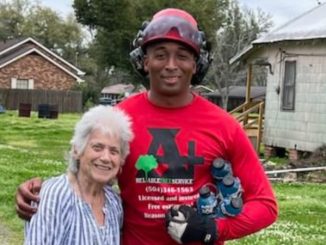
20-year joint venture with Motiva ended Monday
In 1929, Shell purchased the refining company from which the city of Norco earned its name. And, in a sense, Monday marked a day where everything old became new again, and a community was reintroduced to its roots.
A 20-year joint venture with Motiva officially ended Monday as Shell assumed full control of the Norco Manufacturing Complex, the plant transitioning its name and identity back to one so many local people have found synonymous with their home region.
The site’s official name is now Shell Norco Manufacturing Complex.
A new sign with Shell’s iconic logo was being installed Monday afternoon, a vision Shell Norco General Manager Brett Woltjen believes will further foster a connection between a community and a business that has been central to it for nearly 100 years.
“We’ve all been very excited about it,” Woltjen said. “It’s very nostalgic for us, as a site, with the legacy Shell has built over the years. I think when you look at the number of multi-generational employees we have here, people whose father, whose mother, whose grandparents worked here before them … I think it means a lot to our employees to sort of call back to that family heritage they’ve had. It just feels good and feels right to bring back the Shell brand that so many people in our community have been so connected to.”
Until Monday, the complex had been split for use between Motiva and Shell, an arrangement that began in 1998. The change comes a little over a year following the announcement that Saudi Aramco and Shell would divide the assets of Motiva, which the two companies had shared as part of a joint venture.
The roots of the company run as deep in the Norco community as they could be.
In 1916, New Orleans Refining Co. bought 366 acres of rice, indigo and sugar cane fields from the Good Hope Plantation that gave rise to the Norco community, which was named after the acronym of that company.
Within a year, the company began operating an oil terminal there that soon made it the hub of shipping and importing oil products. In 1929, Shell bought NORCO and became an industry pioneer in the area, with other industrial companies following suit and establishing plants in the area.
“Shell is not only a company’s name, but it is also historically tied to the Norco community and St. Charles Parish,” said Parish President Larry Cochran. “They have always been committed to their neighbors and willing to partner for the greater good of the parish.
“The fact that Shell is approaching its 90th anniversary in Norco is pretty significant. We appreciate their exceptional work in community outreach with residents in the Norco area, as well as the economic impact that they provide for our parish and region.”
Sal Digirolamo is the head of the Norco Civic Association and has lived in the city all his life.
The 88-year-old also worked with Shell for 40 years, following in the footsteps of his father. Digirolamo’s brother and two sons have also worked for Shell over the years.
“I retired in 1993, and that was one of the hardest decisions I’ve ever had to make,” Digirolamo said. He said he’s “tickled pink” to see the plant going back to the Shell name, noting while he has nothing against Motiva, the Shell roots run deep, not only for him but for so many others in the community.
“We’re so used to it being Shell. We’ve always called it Shell, really,” Digirolamo said. “I’m glad it’s back, because our relationships with Shell and we can relate back to the company we were born and raised with. Someone would ask you where you’re working and for years it’s, ‘I’m working at Shell, working at Shell, working at Shell’ … when it was Motiva, people still said working at Shell. That’s been instilled in us.”
John Dias, executive director of United Way of St. Charles, said the change brings a familiar, comfortable ring with it.
“I think the name feels like home, right?” Dias said. “That’s what everybody’s always called them. And I think it’s nice to go back to that name that feels like Norco and feels like home. I think it’s a great move. That logo, a lot of people look at it, smile and think of their family tradition here, or of it being in their neighborhood. And I think that’s great.”
Dias pointed out the people who make up the Shell refinery are the same people who make up so much of the local community.
“We think of big business like it is some faceless thing,” Dias said. “But these are people. These are our cousins, husbands and wives, and to have a business with longevity like that, it only strengthens the relationship and trust within the community. Nothing bad comes out of it when you have that kind of longevity. Now, it’s not a business in the community; they are the community.
“You have generations who have been employed there, people who grew up on that property. Who better to look after our community than people who have been a part of it?”
A change people in the area may begin seeing quickly is the different attire employees are beginning to wear.
While the shift is still ongoing, the traditional blue uniforms the complex workers have worn are giving way to red ones, tailored to the colors that have always been associated with Shell.
Woltjen said the number of second- and third-generation workers at the plant is a major secret to the success the plant has had over the years.
“When someone comes to work here after others in their family have, they take ownership of their duties and operate at a higher level,” Woltjen said. “They work hard, show commitment and a greater degree of skill because they want to have respect and live up to that family name.”
He added that the company, in turn, does everything it can to take care of its employees, such as when the homes of 35 Norco workers were flooded last August. The company provided resources to gut those houses at no charge, and gave them interest-free loans to help them get back on their feet and recover.
Woltjen said that comes down to simply “being a good neighbor,” and added that the positive actions flowing between Shell, its employees and the rest of the community continues to build upon itself over time.
“(The Norco complex) is one of the best running assets in the company,” Woltjen said. “We think what makes the difference is the relationship we foster with the community and our employees. The business runs better because of that relationship, and we can also have a better relationship with the community, because we’re run better. It’s a symbiotic relationship and we’re both better for it.”





Be the first to comment